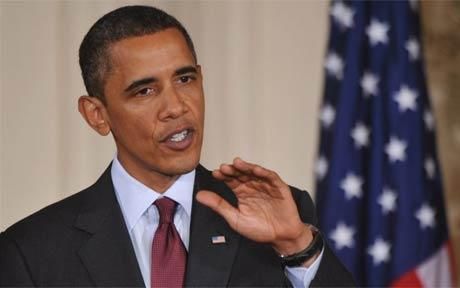This Profligate President! Barack Obama Is Refusing to Listen to Reason on Economic PolicyTHE TELEGRAPH:
President Barack Obama could learn from the old-fashioned German habit of saving money before spending it, argues Jeremy Warner. Barack Obama will meet other world leaders at the G20 summit. Photo: The Telegraph
Barack Obama will meet other world leaders at the G20 summit. Photo: The TelegraphRarely has the dismal science of economics inflamed such passions. While the "cuts versus growth" debate has been building steadily for more than a year on both sides of the Atlantic, over the past week it has exploded into open international hostilities.
A compromised form of words will already have been agreed for the communiqué to follow this weekend's meeting of G8 and G20 leaders; the sherpas who do the preparatory donkey work for these stage-managed events will have ensured it.
But behind the anodyne platitudes of any statement, the tensions have reached fever pitch. Gone is the co-operative consensus that, in adversity 18 months ago, brought G20 nations together to fight the downturn.
In its place lies a clear line of demarcation that almost exactly mirrors our own political debate in Britain over the economic consequences of George Osborne's Emergency Budget cuts. Yet though this debate masquerades as high intellect, it has about as much to do with economics as the outcome of the World Cup.
President Barack Obama, backed to some extent by Nicolas Sarkozy of France, wants economic stimulus to continue until the global recovery is unambiguously secure. In the opposite corner is Germany's Angela Merkel, now oddly aligned with Britain's new political leadership in thinking the time is right for fiscal austerity.
Like much of what Mr Obama says and does these days, the US position is cynically political. With mid-term elections looming and the Democrats down in the polls, the administration hasn't yet even begun to think about deficit reduction. Obama is much more worried by the possibility of a double-dip recession and the damage this would do to his chances of a second term, than the state of the public finances.
As it happens, the public debt trajectory is rather worse in the US than it is in Europe, yet Obama has adopted an overtly "spend until we are broke" approach in a calculated bid for growth and votes.
Read on and comment >>> Jeremy Warner | Thursday, June 24, 2010
Obamonomics: A Definition >>> Mark Alexander | Saturday, March 07, 2009
